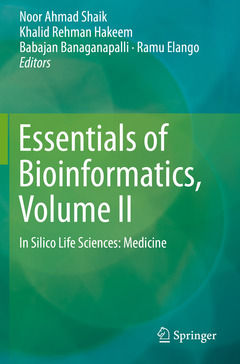Description
Essentials of Bioinformatics, Volume II, 1st ed. 2019
In Silico Life Sciences: Medicine
Coordinators: Shaik Noor Ahmad, Hakeem Khalid Rehman, Banaganapalli Babajan, Elango Ramu
Language: English
Publication date: 10-2020
309 p. · 15.5x23.5 cm · Paperback
Publication date: 10-2019
309 p. · 15.5x23.5 cm · Hardback
Description
/li>Contents
/li>Biography
/li>Comment
/li>
1. Bioinformatics strategies for molecular diagnostics
o Candidate gene selection and analysis of Rare diseases
o Candidate gene selection and analysis of Complex diseases
2. Bioinformatics tools for Molecular Diagnostics
o Single Gene Disorders – Case studies
o Polygenic Disorders – Case studies
o Genetic Tests – Tools, Results, Interpretation
3. Bioinformatics approaches for Genetic Risk Marker Studies
o Population Genetics
o Gene Polymorphisms
o Gene Expression Assays
o Genetic Statistics
4. Bioinformatics for Disease Prognostics
o Pharmacogenetics
o Efficacy
o Toxicity
o Adverse reactions
o Biomarker Selection and Monitoring
o Precision Medicine
5. Bioinformatics tools in Gene Therapy
o Enzyme Replacement- Bioinformatics role is limited
o Gene Replacement (Knock-in)
o Gene Silencing(RNAi)
o Gene Editing (CRISPR)
6. Bioinform
atics tools in Disease Therapeutics – Data analysis tools and applicationo Drug Discovery
o Protein-Drug Interactions
o Drug-Body metabolism studies
o Microbiome
International experts discuss the latest development in bioinformatics
Practical examples enhance learning experience
Applied bioinformatics with broad-based applications for life science researchers




